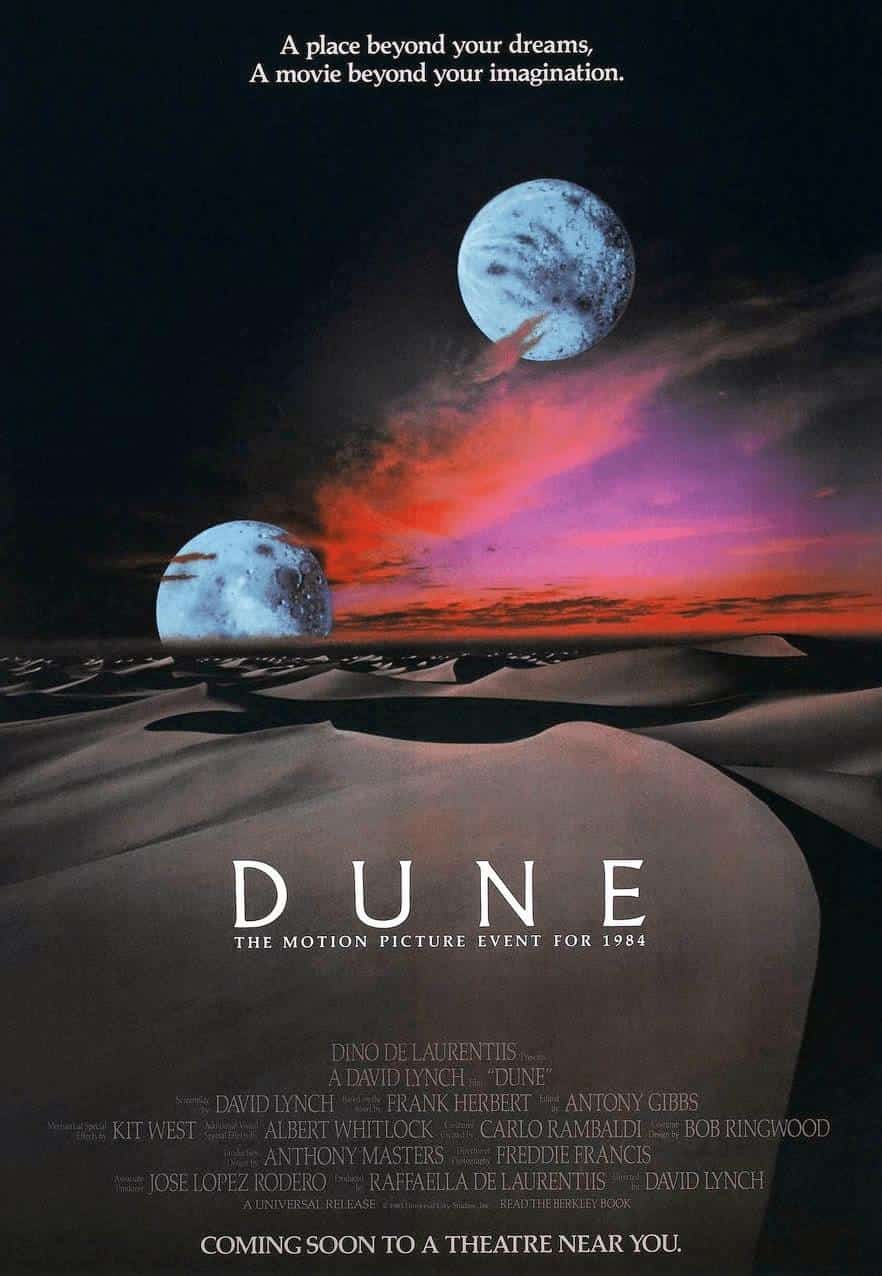
- Starring
- Kyle MacLachlan, Leonardo Cimino, Brad Dourif
- Writer
- David Lynch
- Director
- David Lynch
- Rating
- PG (Canada), PG-13 (United States)
- Running Time
- 137 minutes
Overall Score
Rating Summary
Frank Herbert’s groundbreaking and revolutionary sci-fi novel Dune was first published in 1965 and underwent a long and incredibly difficult process making its way to the big screen. Deemed unfilmable and far too dense for a feature film by many, it underwent several failed attempts to get off the ground in the 1970’s, most notably with Alejandro Jodorowsky who came incredibly close and even had the film mostly cast and storyboarded. But in the year 1984, an incredibly well known and respected filmmaker named David Lynch finally adapted Dune and got it released to theaters with extremely divisive and even at the time disastrous results to the point where he disowned the film and doesn’t even like to mention it in interviews or when asked about it. While this first adaptation of Herbert’s novel is flawed beyond belief and not exactly a great adaptation or even necessarily a good one, there’s still a lot of campy fun to have with it for fans of the novel or audiences who want to find themselves invested in the Dune lore and universe.
Dune is set in the distant future and chronicles the conflict between rival noble families; The Atreides and The Harkonnen’s as they battle for control over the desert planet Arrakis, also known as Dune. The planet is the only source of the most valuable commodity in the universe, the spice which is vital to space travel, among many other things. Believed to be a Messiah among the Fremon people (desert warriors of Arrakis), Paul Atreides (MacLachlan) must rise and lead them against the galactic emperor and his father’s evil nemesis to free their desert world from the emperor’s rule. One of the most polarizing adaptations of all time, it is not a surprise that it was lambasted upon its original release and is still looked down on in a negative way by many, including those involved with the film, but for readers of the original source material, there is still some positive takeaways here.
One of the biggest problems with Lynch’s version of Dune is that it’s not satisfying enough for fans of the novel and is completely inaccessible to newcomers. The film does follow the book pretty well and should be enough for fans to follow along and recognize what Lynch was going for, but at the same time, there’s no way a novel as long and complex as Dune could’ve ever been successfully adapted in a 2+ hour film. The result of that undertaking causes nearly every plot beat, character arc, and every scene to feel incredibly rushed while some of the best parts of the novel aren’t even touched upon or shown. The third act in particular feels like a series of montages that were incredibly fleshed out in the book. That also means it is filled with exposition to an extreme degree and there are many scenes where characters will completely describe the plot and everything currently going on just so the audience doesn’t get lost. Those familiar with the film’s behind-the-scenes drama, it’s incredibly obvious that its opening scene was an added reshoot to help viewers follow along easier, and a very distracting way to open it.
But as a fan of the source material, there are some fun elements to be had here, and it has a certain charming campiness to it. Lynch might not have been pleased with the final result, but he wasn’t a bad pick to direct it and most of its problems came as a result of the studio and its producers. He does a fairly good job at bringing this universe to life, injecting some of his typical weirdness into it, especially with The Harkonnens. For a film that’s nearly 40 years old, its visual effects hold up much better than one would expect. That being said, some of it is obviously dated (the shields being a big distraction) and it isn’t helped by how visually stunning Denis Villeneuve’s new modern films are. Meanwhile, the production and set design are impressive considering the time, and the score is also a highlight. The action sequences are mostly brief but they’re solid and in spite of its issues, the film still delivers an entertaining watch and one that flies by for better or worse. Having to do so much within a short amount of time, audiences don’t get to spend much time with the characters outside of Paul. While most of the cast does well, it’s a shame that most are wasted by the end, especially with Sting (Feyd Rautha) and Patrick Stewart (Gurney Halleck) involved. The then unknown MacLachlan does well as Paul, marking the start of what would be a prolific relationship between he and Lynch.
At the end of the day, David Lynch’s 1984 adaptation of Dune is a polarizing one for several reasons. It is not a great adaptation and will likely be a completely foreign experience for anyone unfamiliar with the source material. But big fans of this world and characters who want to see every possible version of it, then this film comes with a light recommendation. Since its original release, it continues to age increasingly worse with every passing day while Denis Villeneuve’s adaptations make it look way worse in comparison. However, it is far from the disaster many have labels it as. In another universe, Lynch got to make the film the way he intended, and was then graced with a ton of sequels. One can’t help but wonder what could have been and how far he would’ve taken it all.
still courtesy of Universal Pictures
If you liked this, please read our other reviews here and don’t forget to follow us on Twitter or Instagram or like us on Facebook.
Discover more from
Subscribe to get the latest posts sent to your email.


One comment
Chuck Anziulewicz
February 27, 2024 at 10:03 AM
I very much enjoyed Denis Villeneuve’s first “Dune” adaptation, and I simply can’t wait to see part two. Yet there will always be a warm place in my heart for David Lynch’s version. Sure, it wasn’t a commercial success, and the reviews weren’t great, but that wasn’t so much the fault of Lynch as it was the fault of meddling studio executives and financiers.
In the 40 years since its initial release, Lynch’s film has been appraised more positively and has gained cult status. I still find it a much more ENDEARING film for all it’s weirdness, rococo flourishes, and infinitely quoteable lines: “You are so beautiful, my baron. Your skin: LOVE to me. Your diseases, lovingly cared for, for all eternity.”
Comments are closed.